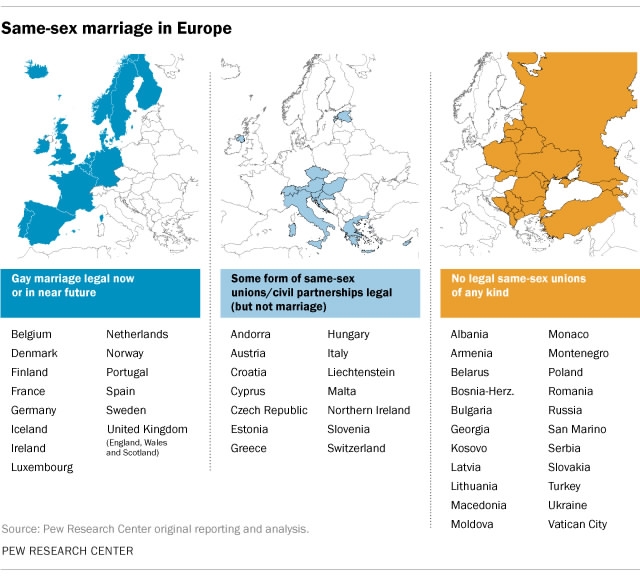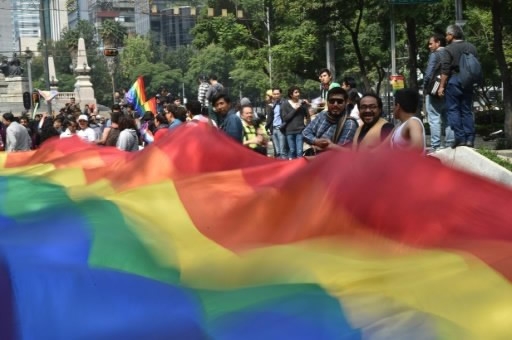Three months after the lower house of the German Parliament voted to legalize same-sex marriage, the country will see its first gay couples married this Sunday.
On the other side of the globe, Australia is in the middle of a two-month-long voting period, with Australians answering the question, "Should the law be changed to allow same-sex couples to marry?" If passed, Australia has a good chance of becoming the 26th country in the world to legally recognize same-sex marriages.
Since the Dutch parliament passed a landmark bill giving same-sex couples the right to marry in 2000, 24 countries have steadily followed suit – mostly in Europe and the Americas. As more of the world’s countries debate the rights of gay couples, we examine the shifting attitudes in the world’s regions.
Europe – Divided between East and West
Among the 25 countries that have legalized gay marriage, 15 of those are European countries – more specifically western European countries. Germany and Malta are the latest to join this list, with parliamentary votes that passed by large majorities.

Although 15 countries in Europe have legalized same-sex marriage, the continent remains divided as no country in central or eastern Europe recognize these types of unions. / Source: Pew Research Center
Although 15 countries in Europe have legalized same-sex marriage, the continent remains divided as no country in central or eastern Europe recognize these types of unions. / Source: Pew Research Center
For most of these countries, gay couples are given almost identical rights to all other couples including the right to inherit property, file taxes jointly as well as adopt children.
Noticeably absent from this list are central and eastern European countries: Romania, Poland, Ukraine are a few that have no legal recognition of same-sex unions of any kind. A
2015 Pew Research Center survey found that the majority of people in central and eastern European countries rejected homosexuality. Armenia and Ukraine had the highest percentage of adults stating that "homosexuality should not be accepted by society," with 97 percent and 86 percent respectively.
While countries with an Orthodox majority expressed traditional social views, age was a factor when it came to attitudes. Of the 18 countries surveyed, adults under the age of 35 were much more likely to favor legalizing same-sex marriage. More than 45 percent of young people in Greece supported granting marriage rights to gay couples versus just 19 percent of older people.
Africa – A controversial topic
In 2006, South Africa codified a court decision which found it discriminatory and unconstitutional to limit marriages to just heterosexuals. Nine years later, South Africa remains the only African country for gay couples to legally get married.
Majority of African countries have made it a crime to be gay. Out of 54 African countries, 33 have laws criminalizing various forms of behavior or attraction between people of the same sex. Punishments range from imprisonment to corporal punishment, and in some cases, death.
Uganda is among one of the most unsafe countries for same-sex couples. In 2013, the country passed an anti-homosexuality law which led to a rise in violence against the LGBT community. The law was declared "null and void" by Uganda’s constitutional court a year later. However, public statements by politicians have made it clear there is very little support for this community. In a statement to the Guardian, Uganda’s Minister of State for Ethics and Integrity Simon Lokodo said, "They [gay people] are beasts of the forest."
The Americas – Steady progress
Canada became the first country outside Europe to give legal recognition to gay marriages in 2005. The US followed Canada ten years later in a historic Supreme Court ruling which made same-sex marriage legal nationwide.

In August 2017, the south-central state Puebla became the latest state in Mexico to allow for same-sex unions. This is still not recognized nationally in Mexico. / Source: AFP
In August 2017, the south-central state Puebla became the latest state in Mexico to allow for same-sex unions. This is still not recognized nationally in Mexico. / Source: AFP
In South America, Argentina, Brazil, Colombia, and Uruguay have all passed measures granting same-sex couples the right to marry. Argentina was the first to give this right in 2010, despite strong opposition from both the Catholic and Protestant churches.
Although the right to marriage is not legal in all of Mexico, a handful of the country’s states, including Mexico City, allow same-sex weddings. In 2016, Mexico President Enrique Pena Nieto called for an initiative to legalize gay marriage, sparking massive protests both in support and against the measure.
The Middle East – Traditional views prevail
In a region where the segregation of sexes still remains, same-sex marriage is not even a topic of debate. Not a single country in the Middle East allows for this type of partnership.
Similar to European Orthodox countries, religion plays a key role in this region’s attitudes towards same-sex unions. Earlier this month, Israel’s Supreme Court rejected a petition from an LGBT rights organization calling for same-sex marriages to be legalized. Iran and Saudi Arabia both have the death penalty as punishment for same-sex activity.
In both majority Christian and Muslim countries, the attitude remains the same – denial. Former Middle East editor for the Guardian Brian Whitaker has made the observation that: “One reason for the comparatively small number of prosecutions is the official fiction that gay people don’t exist to any great extent in Muslim countries; homosexuality is regarded primarily as a western phenomenon and large numbers of arrests would call that into question.”
Asia – A gradual opening up?
Like the Middle East, no Asian country has legalized same-sex marriage, but that doesn’t mean it’s not a topic of discussion. In a landmark case last year,
Taiwan’s top court ruled that same-sex marriage is legal – the first ruling of its kind in Asia.
The court’s ruling is only the initial step, giving the government two years to change its marriage laws. If no legislative action is taken before the deadline passes, same-sex couples will be given the right to obtain "the status of a legally recognized couple."

A photo from a Chinese primary school textbook, showing a baby with two fathers / CGTN photo
A photo from a Chinese primary school textbook, showing a baby with two fathers / CGTN photo
The past two decades have seen China slowly shifting its social attitudes towards gay rights. Up to 1997, being gay was illegal in China and could be prosecuted under a law banning hooliganism. This was lifted in 1997 and four years later, the Health Ministry officially took it off the list of mental disorders.
Partnering with the United Nations Development Programme, Peking University
surveyed over 30,000 people across all provinces of China in 2015, revealing distinct differences in attitudes between age groups.
Only nine percent of people born after 1990 reported that they would reject a child for being gay, whereas 35 percent of those born after 1970 said they would. The UN observed that "the younger the respondents, the higher the proportion of those opposed to the pathological view of homosexuality, stereotype-based prejudices, gender binary ideas and even HIV-related stigma."
Of the non-minority respondents – those who reported not being gay – nearly 85 percent supported the legalization of same-sex marriage.





